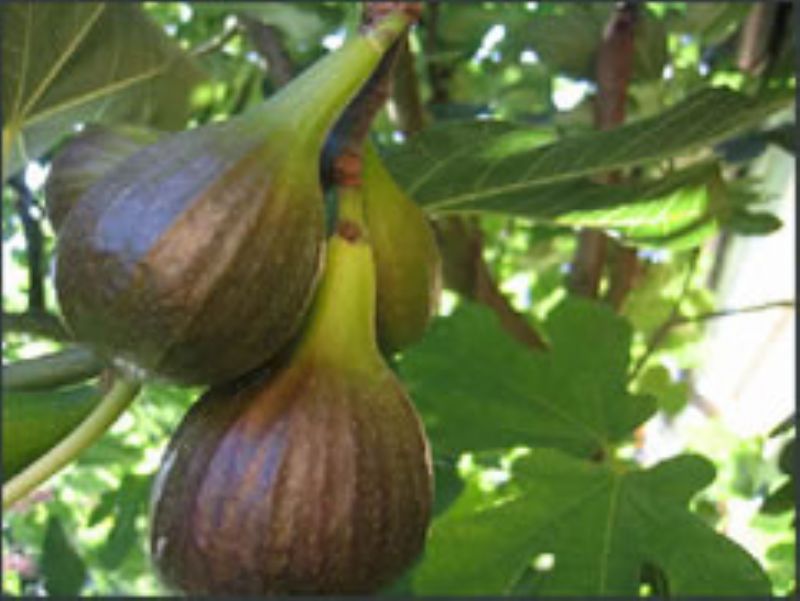
La vecchia storia italiana del fico
Sono sicura che per la maggior parte dei bambini Italoamericani cresciuti negli anni quaranta e cinquanta c’era una distinzione marcata tra “noi” e “loro”. Noi eravamo Italiani.Tutti gli altri, Irlandesi, Tedeschi, Polacchi, erano Americani. Io ero già abbastanza grande quando finalmente riuscì a capire che ero Americana.
Ero nata americana ed ero vissuta qui tutta la mia vita, ma gli Americani erano gente che mangiava burro di arachide e panini di marmellata con pane bianco come era la pappa. Non sentivo rancore verso di loro, ma credevo solo che il nostro sistema fosse migliore col venditore del pane, quello delle uova, quello delle verdure e quello dei polli per citare i nomi di alcuni ambulanti che venivano nel nostro quartiere. Noi li conoscevamo tutti e loro ci conoscevano pure. Gli Americani invece andavano al negozio A&P per fare la spesa.
Mi meravigliavo che alcuni amici e compagni di scuola il Giorno del Ringraziamento e per Natale consumassero solamente tacchino ripieno, patate e sugo di mirtillo palustre. Noi pure consumavamo tacchino, ma prima venivano l’antipasto, la zuppa, la lasagna, le polpette e l’insalata.
Nel caso in cui al nuovo arrivato non piacesse la carne di tacchino, c’era anche quella di manzo. Subito dopo mangiavamo frutta, semi, dolci e biscotti fatti in casa, cosparsi di piccole cose colorate. A tavola imparavamo pure come consumare un pasto di sette portate fra mezzogiorno e le quattro del pomeriggio, come maneggiare castagne scottanti e intingere pesche nel vino.
Gli Italiani vivono l’idillio del cibo. La domenica ci svegliavamo all’odore dell’aglio e delle cipolle che friggevano in olio d’oliva. Mangiavamo sempre maccheroni al sugo. Domenica non era mai domenica senza prima andare a messa. Naturalmente non si poteva mangiare prima della messa perchè dovevamo digiunare prima di fare la Comunione.Sapevamo però che, al ritorno, avremmo trovato polpette in padella, e che nulla aveva miglior sapore di quelle polpette calde accompagnate da pane tostato intinto in una pentola di sugo.
Un’altra differenza tra “loro” e “noi” era il fatto che noi avevamo giardini. Non solo con fiori, ma anche con pomodori, peperoncini, basilico, lattughe e “cucuzza” (zucca). Tutti avevano una pergola d’uva ed un fico. In autunno bevevamo vino fatto in casa, litigando su chi l’avesse fatto meglio. Quei giardini erano fiorenti perchè avevamo qualcosa che i nostri amici americani non sembravano possedere: Noi avevano i nonni. Non è che loro non li avessero. E’ che i loro nonni non abitavano nella stessa casa o nella stessa strada.Noi mangiavamo con i nonni, e il Signore ce ne liberi se non andavamo a visitarli cinque volte alla settimana. Ricordo ancora mia nonna che ci raccontava come venne in America con “la nave” quando era ancora giovane.
Non dimenticherò mai le feste quando i parenti si radunavano dai miei nonni, le donne in cucina, gli uomini nel salotto e i bambini dappertutto. Credevo di avere centinaia di cugini. Mio nonno si sedeva in mezzo a tutti, fumando il suo sigaro DiNobili, molto orgoglioso della sua famiglia e del suo successo.
Ricordo come i miei nonni odiassero abbandonare la casa per qualsiasi motivo. Avrebbero preferito sedersi invece nella veranda posteriore a guardar crescere il loro giardino. Quando dovevano uscire per qualche occasione speciale, dovevano ritornare al più presto possible – dopo tutto non c’era “nessuno che custodisse la casa.”
Quando i miei nonni morirono, le cose cominciarono a cambiare. Le riunioni di famiglia diventarono più rare, e c’era qualcosa che sembrava mancare. Sebbene ci riunissimo generalmente in casa di mia madre, avevo sempre l’impressione che la Nonna e il Nonno fossero presenti.
Si capisce che le cose cambiano. Tutti abbiamo le nostre famiglie e i nostri nipoti. Oggi ci visitiamo ogni tanto o c’incontriamo alle veglie funebri o ai matrimoni. Altre cose sono pure cambiate. La vecchia casa che i miei genitori comprarono, adesso è rivestita di alluminio. Un prato d’erba copre ora il terreno dove una volta crescevano i pomodori. Non c’era più nessuno a coprire il fico che, alla fine, morì. Le feste sono cambiate. Sì, facciamo visite da un famiglia all’altra, ma in un certo modo le cose sono diventate più formali.
La grande quantità di cibo che consumavamo senza nessun malessere non è più buono per la nostra salute. Troppo amido, troppo colesterolo e i dolci contengono molte calorie. La differenza tra “noi” e “loro” non si può più facilmente definire. E penso che ciò sia una buona cosa.
I mei nonni erano Italiani-Italiani, i miei genitori erano Italoamericani. Io sono Americana e ne sono orgogliosa, proprio come i miei nonni avrebbero voluto che io fossi. Ora siamo tutti Americani: Irlandesi, Tedeschi, Polacchi, siamo tutti cittadini Americani. Tuttavia, in un certo modo, mi sento un pò italiana. Chiamala cultura. Chiamale radici. Non so cosa sia. So questo però: che i miei figli e i mei nipoti hanno perso una parte stupenda del nostro retaggio. Non ebbero mai la fortuna di conoscere i miei nonni.
Translated into English
I am sure for most second generation Italian-American children who grew up in the `40s and `50s there was a definite distinction between “us” and “them.” We were Italians. Everybody else, the Irish, the Germans, the Poles - they were Americans. I was well into adulthood before I realized I was an American.
I had been born American and lived here all my life, but Americans were people who ate peanut butter and jelly sandwiches on mushy white bread.I had no animosity toward them, it`s just I thought ours was the better way with our bread man, egg man, vegetable man and chicken man, to name a few of the peddlers who came to our neighborhoods. We knew them, they knew us. Americans went to the A&P.
It amazed me that some friends and classmates on Thanksgiving and Christmas ate only turkey with stuffing, potatoes and cranberry sauce. We had turkey, too, but first we had antipasto, soup, lasagna, meatballs and salad.
In case someone came in who didn`t like turkey, we also had a roast beef. Soon after, we were eating fruit, nuts, pastries and homemade cookies sprinkled with little colored things. This is where you learned to eat a seven-course meal between noon and 4 p.m., how to handle hot chestnuts and put peaches in wine.
Italians live a romance with food. Sundays we would wake up to the smell of garlic and onions frying in olive oil. We always had macaroni and sauce. Sunday would not be Sunday without going to Mass. Of course, you couldn`t eat before Mass because you had to fast before receiving Communion. We knew when we got home we`d find meatballs frying, and nothing tasted better than newly cooked meatballs with crisp bread dipped into a pot of hot sauce.
Another difference between “them” and “us” was we had gardens. Not just with flowers, but tomatoes, peppers, basil, lettuce and cucuzza [squash]. Everybody had a grapevine and fig tree. In the fall we drank homemade wine arguing over who made the best. Those gardens thrived because we had something our American friends didn`t seem to have: We had grandparents.
It`s not that they didn`t have grandparents. It`s just that they didn`t live in the same house or street. We ate with our grandparents, and God forbid we didn`t visit them five times a week. I can still remember my grandmother telling us how she came to America when she was young, on the boat.
I`ll never forget the holidays when the relatives would gather at my grandparents’ house, the women in the kitchen, the men in the living room, the kids everywhere. I must have a hundred cousins. My grandfather sat in the middle of it all smoking his DiNobili cigar, so proud of his family and how well they had done.
I remember how my grandparents hated to leave the house for any reason. They would sit on the back porch and watch the garden grow. When they did leave for some special occasion, they had to return as quickly as possible - after all, nobody was watching the house.
When my grandparents died, things began to change. Family gatherings were fewer, and something seemed to be missing. Although we did get together, usually at my mother`s house, I always had the feeling Nonna and Papa were there. It`s understandable things change. We all have families of our own and grandchildren of our own.
Today we visit once in a while or meet at wakes or weddings.Other things have also changed. The old house my grandparents bought is now covered with aluminum siding.A green lawn covers the soil that grew the tomatoes. There was no one to cover the fig tree, so it died. The holidays have changed. We still make family rounds but somehow things have become more formal.
The great quantities of food we consumed, without any ill effects, is not good for us any more.Too much starch, too much cholesterol, too may calories in the pastries. The difference between us and them isn`t so easily defined anymore. And I guess that`s good.
My grandparents were Italian-Italians, my parents were Italian-Americans. I`m an American and proud of it, just as my grandparents would want me to be. We are all Americans now: the Irish, the Germans, the Poles, all U.S. citizens. But somehow I still feel a little bit Italian. Call it culture. Call it roots. I`m not sure what it is. All I do know is that my children and my nieces and nephews have been cheated out of a wonderful piece of our heritage. They never knew my grandparents.





